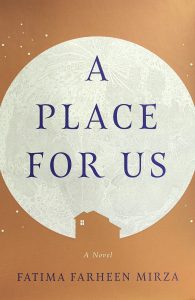 Published by Hogarth/SJP 14 June 2018
Published by Hogarth/SJP 14 June 2018
388pp, hardback, £16.99
Reviewed by Alison Burns
What a fabulously readable novel this is. It is the first from 26-year-old Mirza, and also the launch title from Sarah Jessica Parker’s imprint at Hogarth.
Mirza’s story, like Jumpha Lahiri’s The Namesake, charts the complex struggle by first-generation immigrants to the US from India to maintain a happy family life, as their children begin to fight against traditional rules and values.  Framed by the wedding celebrations for Layla and Rafiq’s oldest child, Hadia, to which their youngest child, hypersensitive Amar, returns after years in the wilderness, it is on one level the story of a prodigal son. Amar is not received with joy and indulgence, however: his childhood and youth have been so stormy and self-destructive that his father is compelled to send him away, although now more in sorrow than in anger.
Framed by the wedding celebrations for Layla and Rafiq’s oldest child, Hadia, to which their youngest child, hypersensitive Amar, returns after years in the wilderness, it is on one level the story of a prodigal son. Amar is not received with joy and indulgence, however: his childhood and youth have been so stormy and self-destructive that his father is compelled to send him away, although now more in sorrow than in anger.
The great achievement of this novel – as of Vikram Seth’s witty and bounteous classic, A Suitable Boy – is that it traces family troubles that could happen to anybody, while showing how these are compounded where there is a clash of cultures. Particularly well handled in Mirza’s seemingly effortless narrative are the stories and rituals from the Muslim tradition, which Layla’s three children learn at her knees and return to with longing all their lives. These reverberate behind the main action, in scenes of early attachment between the siblings and their local friends and in scenes of domestic argument and conflict with their parents.
Studious, ambitious Hadia is drawn to her brother’s friend, Abbas; problem-child Amar, always in trouble at school and with his father, falls in love with Abbas’s sister, Amira. Rules of association between boys and girls are challenged and broken, as these young people pursue lives more independent than those of their parents; but neither of these friendships reaches its desired end. It is not until much later that we learn why Rafiq has such trouble both with anger management and with loving his son as much as he loves his daughters. By then, it is too late for the reconciliation that both Rafiq and Layla have longed for. Their daughters, Hadia and Huda, find their way; Amar, who has never fitted in, never felt that he belonged anywhere, remains a pitiable character to the end.
The title of this touching and unsettling story proves itself in scenes of family life disrupted by internal betrayals and external attacks (on 9/11, for example, Amar begs his father to shave off his beard, so that he will not be mistaken for ‘a bad one’). One longs for this family, in which there is in fact so much love, to be happier.
If this is the standard of Sarah Jessica Parker’s list, we can look forward to a feast from Hogarth.
